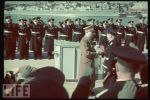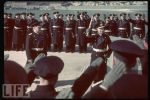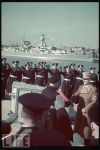Once Axis forces overran Egypt and the Suez Canal, they would close the eastern Mediterranean to the Royal Navy. The British fleet would immediately retreat into the Red Sea, because it could not be supplied sufficiently by means of convoys through the western Mediterranean. Whether or not the Germans seized Gibraltar by a direct attack (& this was virtually excluded because of Spanish dictator Francisco Franco‘s opposition) Britain strategically would be paralyzed.
The Axis could move at will into the Middle East, for the British had no substantial forces there. Thus, not only would Syria & Palestine fall, but German panzers could seize Iraq & Iran with little effort. These two countries produced much of the world’s oil, & their capture would provide ample amounts of Germany’s single most-needed strategic material.
The advance on the southern frontier of Turkey would put the Turks in an impossible position. Hitler was already in the process of gaining Hungary, Romania, & Bulgaria as allies. Therefore, Turkey could be approached either by way of Bulgaria across the Bosporus at Istanbul or from northern Iraq and Syria. Turkey would be forced to join the Axis or grant passage for Axis forces and supplies. A defiant stance would result in the swift defeat of the Turkish army & disaster.
Passage through Turkey would reduce the importance of Malta and Gibraltar. However, both could be eliminated without the active support of Franco & without direct assault.
German forces could easily occupy French North Africa (Morocco, Algeria & Tunisia) with or without Vichy France’s cooperation. From French Morocco, they could approach from the south the small strip of Morocco along the Strait of Gibraltar ruled by Spain. Spain would be forced to grant transit rights, or stand aside if German forces occupied the strip without permission. Spain could not resist for fear of a German attack into the heart of Spain from France. Consequently, German airfields and batteries could be set up along the south shore of the strait. This would close it to Britain – without an expensive military assault on the rock of Gibraltar.
Furthermore, closing the Strait of Gibraltar would force the British to abandon Malta, because they could not supply it.
With the Royal Navy out of the Mediterranean, it would become an Axis lake. This would permit German forces to occupy all of western Africa, including the French base at Dakar, in Senegal. Aircraft, ships, & submarines from Dakar could close down much of Britain’s convoy traffic through the South Atlantic, even without seizure of the Cape Verde islands.
In the Middle East the strategic payoff would be even greater. German forces in Iran would block that country as a route for supplies to the Soviet Union from Britain & the United States. Russia would be left with only the ports of Murmansk on the Barents Sea & Archangel on the White Sea through which goods from the west could be funneled. This would require dangerous passages in atrocious weather, with constant danger of attacks by German ships and aircraft stationed in Norway.
Even more important, the Soviet Union’s major oil fields were in the Caucasus & along the western shore of the Caspian Sea, just north of Iran. Germany could threaten not only an attack directly from Poland & Romania in the west but also from the south through the Caucasus to the Soviet oil fields. This danger of envelopment & quick loss of oil would immobilize Stalin, & obligate him to provide Germany with whatever grain & raw materials it might need. In other words, Germany (without loss of a single soldier) would have the benefits of the Soviet Union’s vast materials storehouse, as well as delivery of tin, rubber & other goods from southeast Asia by way of the Trans-Siberian Railway.
A German position in Iran also would pose a huge threat to India, agitating for independence under Mohandas K. Gandhi & other leaders. From Iran Germany could invade India through the Khyber & other passes, invasion routes long before & long after Alexander The Great made the passage in 326 B.C. Germany would not actually have to do a thing. The threat alone would force Britain to commit every possible soldier to defend its crown jewel. Germany, again without the expenditure of a single man, could immobilize Britain.
In possession of the Middle East, all of North & West Africa & Europe, its armed forces virtually intact, its economy able to exploit the resources of three continents, Germany would be virtually invincible. Britain’s defiance on the periphery of Europe would become increasingly irrelevant. Germany would not have to inaugurate an all-out U-boat war against its shipping. Britain’s remaining strength would have to be expended in protecting its empire and the convoys to and from the home islands.
The United States would have no hope of launching an invasion against the mainland of Europe & an undefeated & waiting German army until it had spent years building a vast navy, army, & air force, not to speak of the transports, landing craft, vehicles, & weapons necessary for such a giant undertaking. It is possible that the United States would take on this task, but the chances for its success would be extremely small. Far more likely, the American people would turn first to counter the expansion of Japan in the Pacific.
Meanwhile Germany could consolidate its empire, bring subject nations into an economic union, & grow more powerful economically, militarily, & politically every day. Before long, the world would become accustomed to the new German Empire & insist on a return to normal international trade.
This at last would give Hitler the opportunity he had sought for decades. He never wanted more of the Soviet Union than the region west of the Ural mountains. Once a de facto cease-fire had been achieved, Hitler could strike at European Russia from south & west, drive Stalin & the surviving Soviets into Siberia, & get the Lebensraum he coveted.





im feeling it